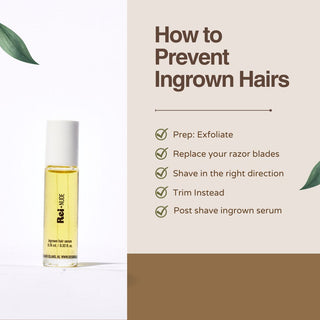There are a few steps you can take to minimize the chances of getting ingrown hairs. Definitely look at your hair removal method, if it’s shaving maybe it’s time to get a new razor and/or switch up your shaving cream. A second tip is to make sure you are exfoliating with Rei-Freshed three times a week, especially before shaving. Exfoliating with our natural product can not only prevent ingrown but help alleviate current ingrown hairs. We would recommend gently scrubbing the area with an exfoliating glove or washcloth to remove buildup of oil and dead skin cells.
Finally be aware of what you are putting on your body post shave. Many products on the market have harsh chemicals like alpha-hydroxy-acids ,azelaic acid and others that can irritate and stress the skin. We would recommend using an all natural product such as the Rei-Nude Ingrown Hair Serum which is made of adaptogens and essential oils to help your body naturally cope with stress.
✔️ Make time for prep. Before shaving an area of your skin, make sure you cleanse it thoroughly via exfoliation and apply a shaving cream or gel to help keep hairs soft.
✔️ Replace your razor often. A single-blade razor is best if you’re prone to ingrown hairs, as they’re higher-quality with sharper blades. But no matter the type you use, it’s best to keep it clean. If you’re going with a disposable, make sure to use separate razors for separate parts of your body—a razor for your bikini line shouldn’t be used for your underarms. As soon as it feels dull, swap for a new blade.
✔️Shave in the right direction. Keep things moving in the natural direction your hair grows. Shaving against the grain or tugging at your skin is a recipe for irritation. Rinse the blade after each stroke.
✔️Go for a trim instead. If you don’t mind the look, using a trimmer instead of a razor or wax won’t cut the hairs as short or anger your skin, which may reduce your risk of ingrowns if you’re prone to them.
If these tips don’t work, check in with your dermatologist, who may be able to offer other hair removal methods that work better with your skin type and last longer.

